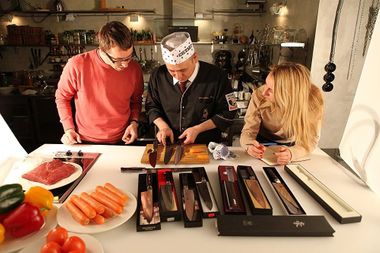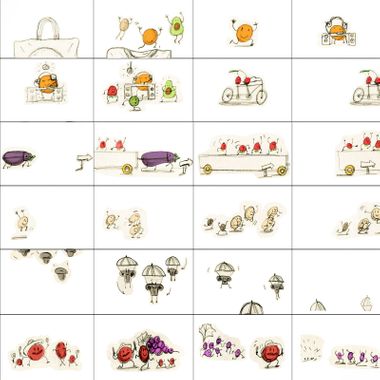Entrepreneurial Burnout: Can I Love My Business Again?
Natalia owns a video production studio. Some time ago, her business was doing great, but she wasn’t. In this article, she explains what steps she took to change the situation and where it all led her.

I fell out of love with my business and was trying to find a way out of my identity crisis. Here’s what I learnt on the way.
The media constantly tells you how an entrepreneur should cope with external challenges: how to adapt to the market, to compete with other players, to protect the rights guaranteed to the business by law. But there is much less information about the question — what if the business obstacle becomes the founder themself?
My story is about self-sabotage, my identity crisis, and facing a new version of myself. Here is how I tried to find the “Reset” button for a year and a half and how everything turned out in the end.
How I slipped into being a foodie
In 2010, I started my internship in a gastronomic magazine. For the next 8 years, food became my passion.
My personal interests and all my professional skills were about food. Food had cultural and social meaning, and determined a lot in my life. I wrote and edited texts about food, stylized editorial and commercial shootings of food, and worked as a food stylist.

Food had cultural and social meaning, and determined a lot in my life. My work days started with Eater newsletter and on weekends I binge watched Chef's Table on Netflix. All over my kitchen at home there were giant stacks of food magazines and restaurant menus from different countries.
I travelled to New York just to attend the Food Film Festival and to Istanbul for street food. In Los Angeles I rented flats not because they were close to the ocean, but because they were close to the place where I wanted to have breakfast every day. It all seemed natural to me.
In 2013, I founded my own small video production studio and started shooting food. I've managed production teams, and produced and directed tabletop. We worked with major clients such as IKEA and Barilla.
Eight years passed, and I found the strength to admit that all of this was no longer about me. In fact, it was still about me, but me from the past. The 2010 version of me, not the 2018 one. I didn't like my job at all anymore.

How I Got Fed Up With Food
I used to see a lot of meaning in food, but now food has become… well, just food. Stories about social glue did not ring true to me anymore, the gastronomic crowd did not attract me, and the bill for dinner in a Michelin restaurant seemed like an unnecessary splurge.
My attitude to work has changed. I look back on what I was and see that I was merely a stoker who spent a lot of energy throwing content into the mouth of a large corporations. All for the sake of corporations just supporting its activity on the social media. Days of exhausting work of more than 20 people resulted in a few seconds of someone’s ‘ad exposure’ on Facebook. It was demotivating, and my work only caused irritation that would not go away even after a long holiday.

Of course, all this didn’t happen out of the blue. I noticed the first alarming signs back in 2017. It was a successful year for business: turnover and profit grew, I received my first award at a USA festival. But the interest was gone, and I was ashamed to admit it even to myself.
This “not interested " thing seemed to be just a whim, and I kept trying to remind myself that I should be grateful for everything I had, everything I had had to work so hard for. I reminded myself that many people dream of their own business and kept suppressing these thoughts.
In 2018, my husband and I decided to have a child. I approached maternity leave thinking, "Oh great, I will use this break for some reflection and then get back to work with 5 new business ideas. I've already come up with one business idea, I can come up with other ones."
At that time, I couldn’t even imagine that I was entering into an even more severe identity crisis and complete professional uncertainty.
One year later, I still didn’t have any new business ideas and I started thinking nervously what to do next. But the more I forced myself to think, the worse I felt. My self-esteem was plummeting. I thought that if I couldn’t come up with good business ideas, then I didn’t have a business mindset and I was not cut out for doing business. I felt very vulnerable: I had a child, and I could not afford to search leisurely for myself. I thought I needed to pull myself together and make my career decisions fast.
When I look back on those moments of despair, I understand my key mistakes:
- I was trying to find only one right career path instead of creating a field of choice for myself.
- I tried to see a clear picture of what my career would look like next and plan my future actions in detail.
- I didn't take any action until I had a plan.
The most difficult thing was to listen to myself and my own desires: what do I want, what am I interested in? When old meanings stop working, new ones are needed. A new matrix of values will not build itself. Therefore, the starting point was the search for meaning. I used the following algorithm to make decisions.
6 steps to finding new values
1. Determine what you value in work
The first correct question I asked myself was “what will make me get out of bed every day without irritation?” I realized that this was confidence that the tasks that I and my team did were aimed at changing the world for the better even if those were only minor improvements. It didn’t have to be the cure for cancer. Saving humanity was not a realistic goal, but the clear, measurable benefits of my work in the future were important to me.
As a result of my work, it should become easier/cheaper/faster for people to do something and that’s what I saw as my goal. And achieving my goal was possible due to technology. So, I decided to focus on a tech-related business.
2. Find 3 new fields you are interested in
I decided that in a professional sense, I was most interested in fintech, biotech and foodtech. Foodtech was at the intersection of IT and my professional niche. It was where my expertise and experience could be relevant.
Fintech grew out of my personal interest. I had read Susanne Chishti and Janos Barberis’ 700-page ‘The Fintech Book: The Financial Technology Handbook for Investors, Entrepreneurs and Visionaries’. And believed that the upcoming changes of the financial world were intriguing.
Biotech interested me because these technologies would radically change medicine in the next 20 years.
After the shortlist appeared, there seemed to be even more questions: almost everything required serious commitment. According to my calculations, I would need to spend about 10 years immersing myself in the field in order to see professional growth in a new industry. I thought about the fact that, nowadays whole professions are born and die within 10 years! And who knows if I would even be alive in 10 years? And if I was, there was a good chance that I again would be a different person in another midlife crisis.
3. Cross out the least realistic options from the list
To narrow down the search field, I had to shorten the list. I crossed out something I had neither expertise in nor prospects for. The biotech industry had to go.
4. Answer 3 different "what to do" questions
- What do I want to do in these new areas in the future and what skills and competencies do I need for this?
- What can I do right now?
- What can I implement in my business? How should I really rethink it and make it interesting again?
I knew that in the future I wanted to do the same thing I was doing. To manage teams. In my own business,I was a Project Manager and I was good at it. I was all about building the right team for the project/specific task, about strategy and management. What I lack now is the skills of a product manager.
For me, the point of entry into foodtech was consulting, as I already had expertise in this area. Creating content helped me to get into fintech. I had no experience in finance, but I had been producing content for large corporations and holdings for 9 years, so I offered my skills to fintech companies.
The next step was to figure out how to rethink my own business. My video production studio which specialized only in tabletop occupied only a tiny segment of the market. So, we needed to go and find a bigger market! Accordingly, rebranding and repositioning was required.
5. Outline a list of companies you want to work with
I had a list of interesting fintech services and people from the industry. These were mainly neobanks. And the people whose projects I kept an eye on also were from neobanks. Two of them were designing chatbot services that helped with business administration: one was Anna Money in the UK, the other one was Osome in Singapore.
"Since the identity crisis is tied to values, then I want to work not just with cool guys, but with guys who are ideologically and aesthetically close to me and are simply interesting as people," I decided, so I went to see how I could be useful to these companies. Osome was just revising its content strategy, looking for writing editors and building up their pool of authors. So I began to work with them.
6. Find practical application for your findings and insights
My company changed its name, redesigned its website, ceased to be a video production studio and became a communication agency. We included consulting in our services and started selling it to foodtech companies.
It used to be that 90% of our projects were digital and TV ad production. Now we develop communication strategies and content guidelines for foodtech startups, and help solve problems like building in-house creative teams.
The agency switched to a 4-day working week. Monday to Thursday I do my business. On Fridays I devote my time to finance and fintech startups and do the following:
- host an educational financial podcast;
- make content for fintech companies;
- run a telegram channel about personal finance.
Conclusion
What helped me most? I think it was the fact that I temporarily abandoned the linear vision of a career in favor of a nonlinear one. I said to myself: "OK, there are many paths to professional happiness. Right now I have many different opportunities at the same time and I will go and explore every one of them."
I still don't know what I want to do when I grow up. Yet a year and a half ago I had 0 ideas, and now I have too many. I am standing at the crossroads of my career. I am interested in strategic marketing and product tasks in foodtech or fintech companies, and I am interested in venture investments and working in a venture fund. I see a lot of options and opportunities for myself. And I will eventually choose something.
Tip
This article is brought to you by Osome. Our professional accountants in Hong Kong are always there for you.







